Movie Review – Superman
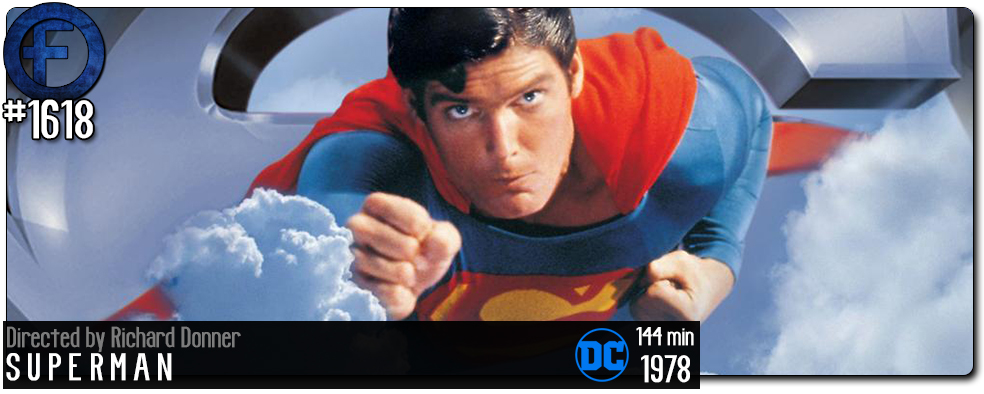
Principal Cast : Christopher Reeve, Margot Kidder, Gene Hackman, Marlon Brando, Marc McClure, Ned Beatty, Jackie Cooper, Glenn Ford, Trevor Howard, Jack O’Halloran, Valerie Perrine, Maria Schell, Terence Stamp, Phyllis Thaxter, Susannah York, Sarah Douglas.
Synopsis: An alien orphan is sent from his dying planet to Earth, where he grows up to become his adoptive home’s first and greatest superhero.
******
Few comic book films are as reverential and revered by fans casual and hardcore alike as Richard Donner’s 1978 big screen version of Superman. It stands alongside only Tim Burton’s Batman and Christopher Nolan’s The Dark Knight as examples of the medium and genre that remain faithful to the core character and popularise the character within mainstream audiences to a degree few films ever achieve. As pure a comic book film as has ever existed, Superman remains an iconic benchmark for the genre thanks largely to Donner’s commitment to the material, the all-star cast surrounding then-newcomer Christopher Reeve as the title character, and big-budget production value by producing studio Warner Bros. Reappraising Superman in this, its fortieth anniversary year, is perhaps the easiest review I’ll write in 2018, a film that has cemented itself in popular culture at a near-genetic level being not just a favourite of yours truly but a genuinely great exponent of cinema in any genre.
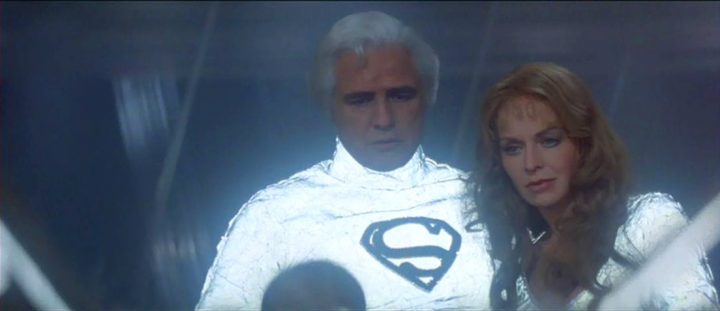
The distant planet of Krypton: scientist Jor El (Marlon Brando – The Wild One) claims the planet will self-destruct thanks to the populace’s indifference to the nearby red sun’s imminent supernova. Desperate to salvage his race and family, Jor El send his son, Kal El, to Earth in a capsule, escaping his kind’s destruction and living and enhanced existence thanks to our yellow sun’s powerful rays. Kal El is found by a local Kansas farmer (Glenn Ford – Gilda) and his wife (Phyllis Thaxter), and is raised as Clark Kent, a boy struggling to keep his incredible superpowers a secret as he grows into a man. Eventually leaving the family farm, Kal El travels to the Arctic, where a crystal recovered from his crashed capsule spurs the creation of an ice fortress, in which the young Kryptonian learns of his true heritage. As Clark Kent, he travels to Metropolis, where he gains employment as a reporter for a newspaper, the Daily Planet, under the auspices of editor Perry White (Jackie Cooper), and his colleagues, fellow reporter Lois Lane (Margot Kidder – Halloween II) and photojournalist Jimmy Olsen (Marc McClure). Quickly, however, he is forced to don the outfit for which he will be most identified, that of Superman, indestructible flying alien saviour who rescues cats from trees and stops bad guys while delivering incredibly poor quips. His popularity puts him at odds with supervillain Lex Luthor (Gene Hackman), who together with his bumbling assistant Otis (Ned Beatty – Deliverance) and sexy girlfriend Miss Teschmacher (Valerie Perrine – What Women Want), devise an ingenuous plan to rid the world of the Man of Steel and use nuclear weapons as part of a dastardly land deal.
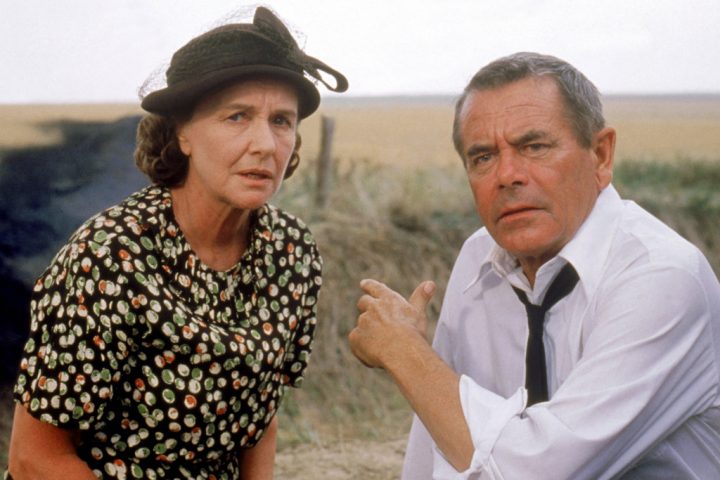
Superman is a film of three distinct acts. A triptych of style, if you will, from Kal El’s tragic homeworld to the final comeuppance of Lex Luthor and Superman’s time-reversing flight, that never fails to inspire awe, delight with its homespun elegance, or thrill with state-of-the-art effects for 1978 in heroism with nary a skerrick of CGI to be seen. Superman is a film of practical effects, big-budget practical effects and a whole load of charm that money just can’t buy. Scripted by Mario Puzo (who was reputedly paid over half a million dollars for his efforts) and directed by Richard Donner (better known at the time for 1976’s supernatural spooker The Omen), Superman’s loving approach to the character, retelling his famous origin and updating the character from the George Reeves television version of the 1950’s, evolves from a deep-rooted admiration of the source, a source created in the late 1930’s by comic writers Joe Shuster and Don Siegel. Superman’s immediately identifiable American-ness and gee-whizz comic book zest encapsulates a lot of what made the character so approachable in the latter half of the 20th Century, before audiences came to expect their heroes to have tragic, angst-ridden backstories and emotional states, and Donner’s sentimental throwback to a period of American history during the film’s second act (where Clark, played by Jeff East, spends his time growing up in the wide-open Kansas expanses) is indicative of this soft-hued nostalgic viewpoint for the genesis of Superman’s innate goodness.
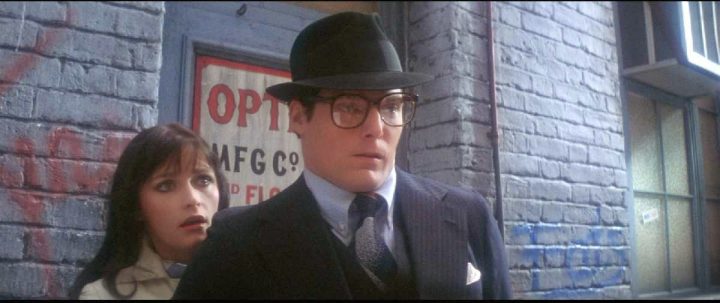
The opening act is, most famously, all centred around megastar actor Marlon Brando as Jor El, Superman’s birth-father. Brando was famously paid an exorbitant amount for barely a week’s work, and even postulated that he needn’t even appear on set because for all we knew, Kryptonian’s could very well look like a suitcase and not a humanoid: the casting of Brando, however, gave Superman gravitas, a legitimacy now followed today by every A-list actor getting into comic book movies as serious art. Gene Hackman’s cocksure portrayal of Superman’s arch nemesis Lex Luthor, here a ludicrously cartoonish property fraudster and nuclear terrorist (as opposed to the modern incarnations of Trumpian businessman, or uber-intelligent criminal godfather) hell bent on sending California into the ocean by triggering a quake along the San Andreas fault-line, is among the film’s less serious elements, but Hackman gives the part his all and makes it work. Aided by a buffoonish Ned Beatty (in the role of Otis, a character I couldn’t stand as a kid and really struggle to accommodate today) and delectable Valerie Perinne as the voluptuous Miss Teschmacher, Hackman’s trio of villainy manifest through the film’s second half as the brains against Superman’s brawn.
Of course, the romantic elements to Superman come largely from the addition of Margot Kidder as the feisty, strong-willed ultra-feminist reporter Lois Lane, a prototypical woman-in-a-man’s-world archetype from the comics writ large by the actresses’ sharp tongue, with a rigid focus on career and a single-mindedness that could come across as bitchy but in reality is kinda cute. Kidder’s Lois Lane is, to my mind, the exact Lois Lane I got from reading the comics. A perfect foil for Superman, and a woman who wouldn’t knowingly put herself in harms way (like early era comic storylines would often do…ugh) but still get into trouble on the way to getting the scoop. Kidder’s work colleagues in Jackie Cooper’s Perry White, the Daily Planet’s chief editor, Marc McClure’s eager-yet-ignorant Jimmy Olsen, and the variety of distant office dwellers surrounding them provide the raucous backdrop a solid newsroom needs to sell itself as a hive of activity, and a lot of the film’s subtle wit is displayed here in dialogue. How many S’s in “massacre”?
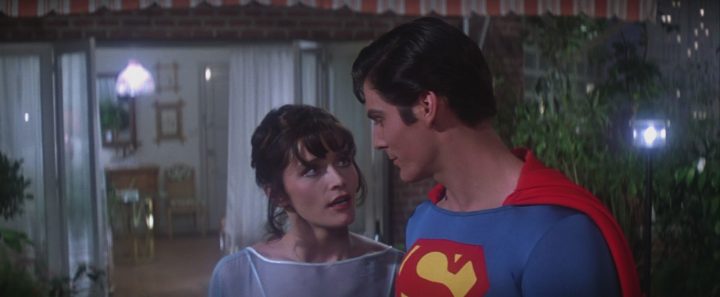
Arguably the most important role, however, belongs to Christopher Reeve, the actor cast to play both Superman and Clark Kent, a dual role requiring physicality and, in Donner’s version of the role, a somewhat simpering, fearful pearl-clutching rendition of the newspaperman. In this era of Superman, Kent was merely the disguise Superman used to get around in everyday life; today’s comics have Clark as the underlying primary figure, with Superman being the “act” he uses when in hero mode. Reeve’s performance as Clark Kent is a chameleon-like one with respect to his on-screen presence. His Clark is a hunched, alto-voiced squeaker, a country bumpkin finding his way through the big city much to Lois’ general disdain. Reeve’s Superman is, naturally, the epitome of American strength: tall, dark and handsome, literally torn from the pages of DC Comics and thrown against the biggest, widest visual effects Hollywood could buy. He personifies the ideals Superman stands for, and you implicitly trust that he is who he says he is, as cheesy as it might seem. In fact, Lois does call out the inherent cheesiness of Superman’s “truth, justice and the American Way” line with modern cynicism, although the film never approaches the darker aspects of superheroing and instead uses this element as a foundation for success. Kudos to Puzo for straddling the clean-cut, overeager nature of Superman’s more fantastical elements with the grounded, realistic approach to the character with the success he and Richard Donner achieved. Reeve, for his part, could have sunk beneath the status of playing the world’s premiere superhero, but not only did he make it his own he embodied the part in his real life as well – Reeve was severely crippled in a horse-riding incident in the mid-1990’s, and would pass away a decade later following complications from his physical restrictions, becoming a spokesperson for those similarly afflicted – and remains, to-date, the most identifiable touchstone performance of the role on the screen.
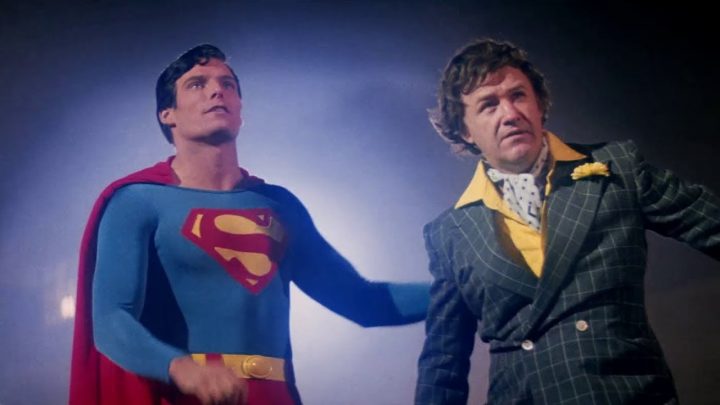
Superman’s technical aspects match the performance and narrative elements pound-for-pound. The film was the most expensive ever made back in 1978, and with its then-hefty pricetag of $55+ million came some showstopping visuals. Making a man fly on the big screen couldn’t be achieved with computers back in the late 70’s, so everything had to be done practically. Rotoscoping, backdrop photography and extensive wire rigging was used to make Christopher Reeve and that famous costume look like it was flying through the air in a manner not seen by audiences of the day. Although the effects have dated by today’s standards, there are some shots in the movie that still look astonishingly real (the first glimpse of Kal El in costume, about forty minutes into the film, flying through the Fortress Of Solitude, still gives me that gasp of air breathtaking moment of disbelief, because it really does look like Reeve is doing it unaided, even as he twists and diagonally darts off the edge of frame) and the use of stunts is particularly exemplary. The high point comes with Superman saving Lois from falling to her death off the roof of the Daily Planet building from a crashed helicopter, while another cool moment sees Superman startle a suction-cup wearing cat burglar half-way up one of the city’s skyscrapers. The work to create Superman as a real, tangible inhabitant of our world using his amazing powers to defy gravity and physics is beautifully executed, and even now, nearly half a century later, it still boggles my mind at how they achieved it all.
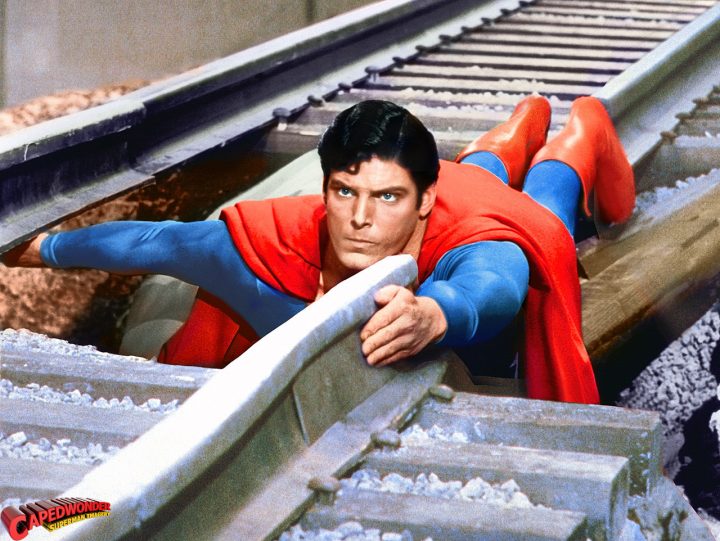
Of course, two elements in particular form the centerpiece of why I love this film so much. The contributions of cinematographer Geoffrey Unsworth – who passed away prior to the film’s release, and is credited with a memorial card at the film’s opening – in giving the film its distinctive look, and composer John Williams, who gave us one of his most popular movie themes, cannot be understated. Unsworth’s soft-focused lensing of Superman’s Smallville sequences, his sci-fi tones of the Kryptonian opening act, and the slick modernity of Metropolis-set second half, evoke feelings in the viewer that are closely associated with the genre to the point you cannot separate them out today. The use of colour and tone, the editing by Michael Ellis and Stuart Baird, the framing of Clark and Superman through their arcs on the screen, and the rapturous, triumphant, romantic, gorgeous soundtrack accompanying the visuals is pure movie magic. It’s the perfect combination of thematic material and creative influence, with Donner a master chef mixing them together in to create a superheroic symphony. Williams’ iconic Superman March, as well as the famous “Can You Read My Mind” theme in which Lois goes on a flight through the night sky with Superman, have become standards of the composer’s playlist, while Unsworth’s notable aesthetic filtered through (in increasingly lessening degrees) into the inevitable sequels.
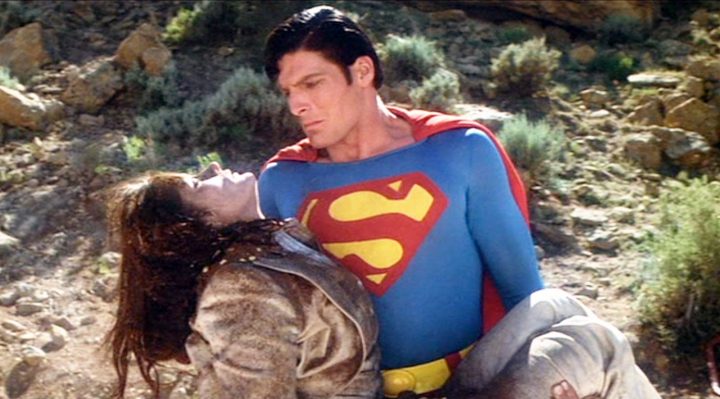
Superman captured a hero in his prime at a time when the world desperately needed one. America’s keynote comic book titan distilled into a brilliantly portrayed rebirth of the role by Reeve, set against a buffet table of Hollywood heavyweights and superstars, with an instantly iconic orchestral score and eye-candy visuals, there was little the film could have done better to bring in its enormous global box-office. Despite looking severely of-the-period today, the film’s underlying themes and core aspects to the central characters hasn’t really changed through the years, even now, and these primal comic creations remain enduring for this reason. Richard Donner’s Superman might not offer the cacophonous explosions and chicanery of the current DCEU Man of Steel, but it offers a load more heart and unwavering belief that being a Superman isn’t a bad thing but something to be striven for, the American Ideal in human form, manifested by Christopher Reeve’s dedicated performance.

